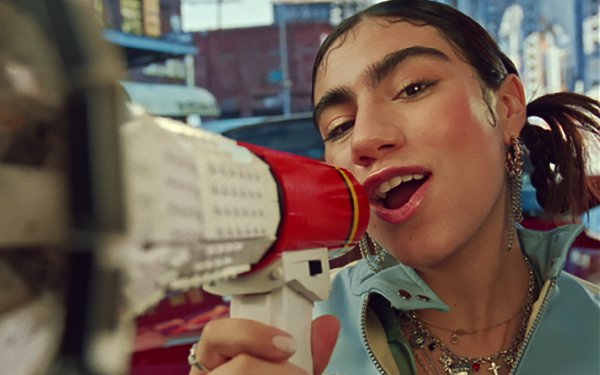
For Beth McKenna, head of U.S.
marketing at the Lego Group, the new “She Built That” campaign isn’t just another brand moment—it’s a personal
one. Backed by global research, the campaign takes aim at the persistent gender gap in how people view “builders,” spotlighting how often the term is still coded as masculine. With a
high-energy music video, reimagined lyrics from Run-DMC, and a crew of Gen Z and Gen Alpha creators, Lego hopes to inspire a new generation of girls to see building not as a boys’ club—but
as a birthright.
McKenna tells Marketing Daily how the campaign came together, why those stereotypes still run so deep, and what brands miss when they chase purpose without staying
grounded in play.
advertisement
advertisement
Interview has been edited for length and clarity.
Marketing Daily: Tell me what sparked the creative idea. I love the way you’ve reimagined
Run-DMC in Lego.
Beth McKenna: It all starts with redefining traditional views of who a builder is. The insight came from research that the Lego Group did globally to understand
perceptions around building. We surveyed both parents and kids, and for the most part, there’s a certain gender skew. This campaign is about empowering girls and sparking their
creativity—that they can build anything.
It’s especially cool that we were able to work with Run-DMC and leverage this iconic song. It really rings true with most parents, too,
like myself. I have a 7-year-old daughter. The anthem became a purposeful baseline, a jumping-off point for the story we want to tell and the joy we want to spark.
Marketing Daily: What
part of that research hit you hardest?
McKenna: One of the insights is that 70% of girls find it hard to think of themselves as someone who is good at building things. As a mom, I
understand that. My daughter—she is seven—is such a sparkplug. But you see the pressures society puts on girls. It’s sobering. But this campaign isn’t about the stat.
It’s about showing that they are builders already, and helping them think about it in a different way.
Marketing Daily: The kids in the video are terrific. What gave you
confidence that they’d make the message feel authentic, not like the many other brands shouting about girl power?

McKenna: Part of it is finding the right creators. There’s the foundation
of the original song, but we also gave it a new spin—new lyrics. The girls helped shape the creative and how it comes to life.
Anytime you work with creators, it’s important to
understand them and their audience. That helps make sure it’s authentic and represents who they are. We picked them for a reason: collectively, this group has more than 100 million followers
worldwide. They already have influence and connection, and we wanted to harness that in a real way.
Marketing Daily: What are the metrics you’ll be watching most closely?
McKenna: One is top-of-mind awareness—both with adults, who are often purchasing, and with girls themselves. Are we the brand they think of when they’re asking for a gift? Those
are long-term brand equity measures. But we’ll also be tracking momentum. What type of social conversation are we generating? What’s the sentiment? What are the traffic patterns?
The campaign is broad. There’s the music video as the centerpiece, but there are other expressions, like creative workshops in stores where kids can build and express themselves. Online,
people can create avatars and their own version of the video. It’s all about enabling inclusive play and creative experiences.
Marketing Daily: Lots of brands say the right
things. How do you know if you’re actually being heard?
McKenna: You can say it, but if you’re not walking the talk, it doesn’t matter. We commissioned the research.
We learned. Now we’re celebrating creativity and building—and trying to empower girls even more.
It’s not just about saying the right things. We’re creating workshops
and digital tools so there are tangible ways girls can get involved. It has to be fun. It has to be joyful. That’s what this brand is about.
Marketing Daily: Lego is one of those
rare brands that seems to be universally loved. What do you think gives it that cultural relevance?
McKenna: It’s the fundamental belief in the value of play. That it
matters—no matter your age, no matter where you are in life. It’s essential to mental health and well-being.
It’s something I noticed as soon as I joined. I used to work at
Reebok, where we talked about the power of movement. This is very similar—play looks different as you grow, but it’s just as important.
You can see that spirit in our Boston
headquarters. Every conference room has Lego bricks in it. It’s not your typical corporate environment.
Marketing Daily: Many people played with Lego as a kid and now buy it for
their own kids. How do you think about that cross-generational connection?
McKenna: Most people know the brand. Awareness is over 90%. But there’s also a lot of growth coming from
adults buying for themselves. The category calls them “kidults.” Many use Lego as a mental-health tool.
Botanicals are a great example. They’re beautiful, so people display
them. It becomes self-expression and decor.
Marketing Daily: Can you give us a sense of the scale of the new campaign?
McKenna: It’s one of our biggest
efforts of the year. We have a few “big bets” annually—holiday is obviously huge. This effort is global, and has already gotten a lot of earned coverage. The U.S. paid campaign will
roll out closer to August. But this is not a one-and-done. It’s a platform we plan to build on into 2026 and beyond.